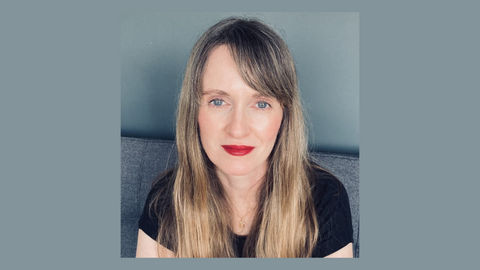
After a break, our series continues, where we ask leading specialists, about themselves and their field.
Meet Dr. Deborah Jermyn, a Reader in the School of Arts & Digital Industries at the University of Roehampton. She is author and editor of 11 books and has published widely on issues pertaining to women and the media, in particular around women film directors, and gender and ageing. Her current research focuses on the implications of the ‘menopausal turn’ in UK culture, and how and why public discourse about menopause has escalated in recent years. In her spare time, she enjoys films, friends and family.
Tell us a little about yourself and how you initially became interested in ageing, gender and the menopause?
I’m a film and media scholar at the University of Roehampton where for many years my teaching and research has centred on gender, feminism and popular culture. Then some years ago, I began to be particularly interested in ageing and gender in culture. This was shortly before I turned 40 and had my son, so I don’t doubt that my academic interest in ageing was bound up in reaching a milestone in my own ageing – being referred to as having a ‘geriatric pregnancy’ was an interesting experience!
But I was also really struck by the comparative absence of critical attention to age and ageing in media and cultural studies. It’s a fundamental constituent of everyone’s identity, and ageing is something we will all experience presuming we are fortunate enough to be around for a while. So why wasn’t ageing a more prominent theme in media analysis? I decided to dive in, with a particular eye to how ageing is gendered.
Clearly our experience of ageing is not only determined by gender, though, but by class, race and all the intersectional elements of our identities, so my work is very much shaped by that awareness. With this in mind, and looking at a breadth of media examples, I published work, for example, looking at the rise of older women as romcom heroines, the adoption of older women as advertising models, and debates about older women’s careers timing out on British TV where their male counterparts enjoyed far greater longevity. Engrossed in all this, it was inevitable that I would become increasingly aware that something very interesting was happening in relation to public discourse on menopause.
From being something considered a bit ‘taboo’ or inappropriate for polite conversation, it seemed to be gaining visible purchase across multiple sites, from education, to retail, to politics, publishing, medicine, the workplace, and more, gathering momentum in the 2010s and interestingly flourishing in the pandemic. Rather than being ashamed of being identified as a menopausal woman, or fearing what that might mean for their career, public figures were increasingly sharing their (frequently negative) experiences of menopause. I began to explore all this in conference papers, calling it ‘the menopausal turn’, and this is now a key focus for my research - because there is so much at stake in the menopausal turn, in terms of our understanding why it’s happening now, who has vested interests in this shift and why, where it might be heading, and what the implications of this new narrative could be. Earlier this year I published my first journal article on the menopausal turn in The Journal of Aging Studies. It’s ‘open access’, which means anyone can read it (for free!) – so any interested readers can find it here.
Where do you feel the current media interest in the menopause will take us?
There is clearly a big media appetite for menopause coverage right now. But what remains to be seen is whether this is going to be a ‘movement’ that has a limited life span in the media and becomes a period we look back on as a phase of some kind, or whether it becomes recognized as an ‘issue’ of sufficient magnitude to warrant an ongoing place on the media agenda. And partly this will be determined by what current menopause campaigns and activism achieve; if better protections, representation and legislation are put in place as a result of that work, then clearly the kinds of campaigning currently called for and featuring in the media won’t remain necessary in the same way (eg expanding medical training to include more adequate compulsory menopause instruction).
Menopause certainly seems set to be increasingly monetised and commercialised – so it’s vital we ‘follow the money’, as they say, and I hope too that we will see people being encouraged to equip themselves with knowledge and awareness of how to navigate that marketplace. We need to be asking how media coverage might become more expansive and inclusive of more experiences and approaches also. There is some concern, for example, that the current direction of travel has become focused on HRT, and while very clearly this has been positively life-changing for many, for various reasons it is not for everyone. And there is a concern too that while a lot of media profiles generally have happy endings – about how someone reached a new equilibrium or sense of purpose in their life following menopause – many of them also entail stories about menopause having a very destructive impact on them, for a period at least. On the one hand this willingness to be frank about the fallout of menopause for some can serve a valuable purpose, for example, removing some of the shame and isolation it can bring. But there are also fears that if this becomes embedded as the most prevalent narrative, counterproductively, it may be weaponised against those in menopause (that is, as proof that they are perhaps more vulnerable or less capable than others). Again, how might a greater breadth of angles answer to this? Finally, it would be good to see media coverage making it an intergenerational story – framing it as something people of all ages have a vested interest in understanding, because they do!
How do you feel vision of female ageing has changed?
Old habits die hard. The familiar stereotypes of ageing women in Western culture are still not hard to find. We’re still too ready to see men as growing and gaining gravitas as they age, where we see female ageing as a process of loss. At the same time, it feels like we are calling this out more than ever and with our ageing demographic, it’s going to remain important and necessary to do so. We know that women are being called on to remain in the workplace longer, for example. Of course, we mustn’t let celebrity culture become the only lens through which we approach attitudes to female ageing. But to see Michelle Yeoh and Jamie Lee Curtis, two 60+ women, being celebrated on stage at the Oscars recently, clearly not past their prime but collecting the Best Actress and Best Supporting Actress awards – and crucially too, one of them being Malaysian and thus becoming the first Asian actor to win that award - felt like an important moment in all this.
How important do you feel role models are for women entering the menopause?
Role models are arguably important for every stage of life, and in that respect, menopause is no different. An increasingly popular maxim in recent years has been, ‘If she can see it, she can be it’, advanced by the Geena Davis Institute on Gender in Media, for example. What this captures, is that everyone, whoever you are, whatever your identity, needs to see themselves represented - and your perceptions of who and what you might be can be expanded or delimited by the representations of people ‘like you’ that circulate out there. In fact, Michelle Yeoh alluded to this in her Oscar acceptance speech when she spoke to, ‘all the little boys and girls who look like me watching tonight’, telling them to ‘dream big’. One reason many people share that they felt really distanced from understanding themselves as perimenopausal or menopausal is because of the archetypal imagery of menopause, and how they couldn’t see themselves in that – namely, a grey-haired ‘old lady’ staring sadly into space. What else might menopause look like?
I think something we need to be conscious of in this moment, then, is that while in many ways the rise of media coverage of menopause is something to welcome, it has become very entwined with a particular body of celebrities who have a platform to share their experience. So, while it can be said they are using this to advance public conversation about menopause, at the same time this also risks entrenching a narrow vision of who and what menopause is ‘about’; that is, largely middle-class white women. Such women’s experiences of menopause do not necessarily chime with the experiences of women of colour, or trans or non-binary people, or the economically disadvantaged, for example.
This invigorated attention to menopause provides a real opportunity to re-set old attitudes to menopause. And our understanding of it needs to be more diverse and inclusive than it has been. We need more ‘role models’. Hence, it’s essential that the optics and narratives of menopause coverage extend across a breadth of experiences – which the stories of white women celebrities cannot encompass. Here I’d flag how the work of Dr Nighat Arif continues to be hugely important, alongside others too such as community advocate and menopause activist Anita Powell, and Karen Arthur, who set up the ‘Menopause Whilst Black’ podcast. These are just some of the voices we need to amplify further.
Who are your heroines?
I’ll start with Mary Anning, the 19th Century paleontologist. She was born to a disadvantaged family who endured tremendous loss and struggle, living on the Jurassic Coast and supplementing a living with fossil hunting. I learnt nothing about her at school, and she was never given the recognition she deserved in her lifetime, yet her discoveries about prehistoric life were absolutely ground-breaking. Happily, the marginalization of her import has since been acknowledged, and a statue of her was recently erected in Lyme Regis thanks to the ‘Mary Anning Rocks’ campaign. I find it hugely moving and inspiring that as a working-class woman in an era where both those things meant no chance of an advanced formal education or endless other opportunities, she nevertheless found ways to do the work that drove her and changed the way we understand the world forever. Now the Jurassic Coast has become a place I love to visit, and whenever I am in Lyme Regis I like to make a point of visiting her grave and paying my respects to her.
And more recently, Greta Thunberg. I was lucky enough to go and see her speak with my daughter at a rally in Bristol in 2020. It was palpable what a beacon of hope and change she is for so many, especially young people – helping revolutionise the narrative about climate change, speaking truth to power, while also challenging our preconceptions about autism through everything she has achieved. And one has to tip one’s hat to anyone who helps get Andrew Tate arrested.




Leave a comment